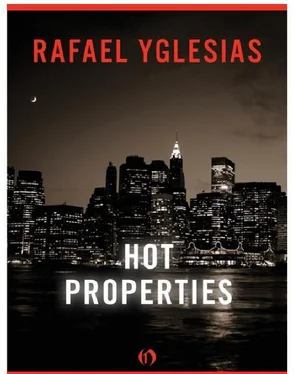He closed his eyes to avoid dealing with them. She got up. He lay there, his arms resting on his chest, a dead man displayed in a coffin. His eyes burned, his head felt huge, exhausted, unbalanced. He woke briefly when he felt blankets covering him, and caught a glance of her, dressed, tucking him in.
And then there was sleep. Sleep accompanied by loud, colorful dramas; cavernous rooms, echoing theaters, brilliant parties, looming faces pleading, shouting, mocking, praising — his life came together in a grand one-acter, a cast of thousands, all mixed up, childhood friends arguing with adult enemies, characters from Chekhov and Shakespeare bantering, Ralph Kramdon fighting to the death with Laertes, Maureen accepting a Tony, his father telling him in an airport coffee shop that he was going to remarry.
The brilliant light of California roused him from time to time, flowing through the skylights, the slanted windows buffeted by the sonic thunder of the surf. He closed his eyes each time, clutching the dreams like a woman he loved, returning to the wonderful stew everything he had experienced became, nourishing his scattered consciousness. He said things he had always wanted to, he remembered his triumphs, his youthful, exquisite talent blossoming, knowing how it should be done, seeing it happen, and hearing the happy welcome of the audience, laughing with him, crying with him, a mass orgy of shared fears and hopes.
Garth, all tentativeness gone, woke him finally with the news that it was one o’clock in the afternoon, and offering a cup of coffee. He sat on the bed and watched Tony sip it, neither of them speaking.
“We can finish today,” Garth said at last.
“Oh, we’ll never be finished,” Tony said. Hangovers must be good for me, he thought to himself. He felt totally in command.
Garth looked surprised. “Why not?”
“Come on. Bill. You people never finish. Even when you make the movie, you’re not finished. Only art forms can be finished — a can of tomatoes is forever being repackaged.”
Garth looked hard. Those chiseled cheeks froze, a statuary bust placed on a mountain, fiercely American. “If you believe that, you shouldn’t be writing movies.”
Tony nodded agreeably. “You’re probably right.”
“You know I get pretty sick of you New Yorkers. With your snobbery and your bullshit. You’re willing to take the money, you do sloppy work, and then you complain we’re only interested in money.”
Tony smiled. “You’re right. You’re absolutely right.”
Garth frowned at him. He wanted to fight.
Tony spoke casually. “Who are you going to get to rewrite it?”
“What?”
“Who are you going to bring in to rewrite my draft? I suggest you go for a good dramatic writer. The script’s structure is okay now and I’ve got you a couple of cute funny scenes, but you need somebody … oh, just a trifle pompous, not in a bad way, to really do the heavy stuff.” Tony sipped his coffee, studying the baffled look on Garth’s face. It was wonderful, silly and wacky, just like his dreams. “You know what I mean,” he argued. “Scenes with very few words, shot darkly, a lot of glistening tears. Meryl’ll play it then. You guys’ll walk off with dual Academy Awards.”
“What the fuck do you think you’re playing? A game? You think because I let you fuck her. I’ll take this crap?” Garth’s real anger wasn’t very different from his screen fury. His face seemed to widen with internal explosive force, his lips disappeared while he clipped his words.
Tony smiled. He had an idea for the next moment in the scene. He thought it would really play nicely. He sat up more, put the coffee down, and picked up the bedside telephone. He dialed the general number for International. “Hello,” he said to the operator. “Mr. Winters please.”
“Oh, for Chrissakes.” Garth got up nervously, his face scared, and made as though to leave, but predictably (Mike Nichols wouldn’t have permitted such an obvious bit of blocking) he stopped at the door when Tony told his father’s secretary, “Hi, this is Tony Winters. … Hi, how are you? … No. you’re right, I have been remiss. In fact, I wanna correct that. Could you tell my father I’m going to come by — Oh, I’m in Malibu, it might take me an hour or so to get it together.” Garth shook his head over and over with disgust. “Well, if he’s not back from lunch by then. I’ll just wait, okay? … Great, thanks.”
Garth didn’t turn to face him. He put a hand on the tall window and hunched over as though bowing to the endless expanse of the Pacific. “What the fuck do you think you’re doing, Tony?”
“Nothing,” Tony said, pulling the covers aside. He put his feet on the ground gently, testing the floorboards as though they might give way. “I haven’t had a good talk with my dad”—he stood up and smiled—“dear old Pops, in years.”
Garth pushed himself off the window, wheeling gracefully, a dancer pirouetting. The nervous look was gone. “We’ve still got the last scene to write.”
Tony laughed — it sounded shaky. “We,” he mumbled.
“Yeah,” Garth answered pugnaciously. “We.”
“After I talk to my dad,” Tony responded.
“You’re a big boy, Tony,” Garth warned, readying for his exit line. “Check your arithmetic. Don’t add this up wrong.” He fixed Tony with a glance for a beat, and then moved out of the room confidently.
Left alone, Tony was uncertain, feeling woozy and confused. He had had nothing particular in mind when he phoned his father’s office. He had done it as a prank, to throw Garth. But now it seemed like a good excuse to confront his father, to ask him the questions that he had spent a lifetime … avoiding? No. Asking himself. It was time to find someone with answers, not simply more questions.
In the end, Mrs. Thorn pretended they all still had their heads firmly attached to their necks. David was told to write his account immediately. He casually asked to be allowed to return home to change. Permission was granted, but they wanted him back within an hour or so, and expected a version by morning.
It was midnight when he walked out of the Newstime building for the last time. The radio cab was waiting. He took his carry-on luggage into the back seat and leaned on it while they drove down Fifth Avenue. He half-expected the city to look different, since he and his life had been so completely changed by the last two days. He wanted something in the architecture of New York to reflect the altered inner landscape of his mind. But, he realized, what made the town so majestic was its indifference. They passed a laughing couple on a corner, the sounds of their joy swallowed by the building’s hollows. A rag-covered woman moved, head bowed, under the public library’s lions — an ant crawling up an impossible stairway, liable to be stepped on by the giants who surely must inhabit such a building. Everywhere the stacks of lighted boxes suggested countless lives, at rest or restless, unaware of their insignificance.
Once he had looked at the city as a sight to conquer. He rode home from the magazine feeling the power and influence that surrounded him, certain his fate would be to move these people, to tell them what to think, what to do. Behind the mask of objectivity had lurked the even darker face of power. What a silly youthful dream. It could never have happened, it hadn’t been a dream that was coming true — he was simply another doll living in these endless rows of dollhouses. Toys for giants he neither knew nor understood.
He wondered how long it would be before Patty would tell about the things she had found. At first she’d swear to keep it to herself — probably to spare herself the embarrassment. But when she got another lover, that fear would dissipate, and it would join the repertoire, another story of another crazy lover from her past. She’d use it, if not in her next novel, then in the one after.
Читать дальше












